It’s Good To Be King: Suzerain’s Kingdom of Rizia
A sizeable DLC that adds a unique full-length campaign
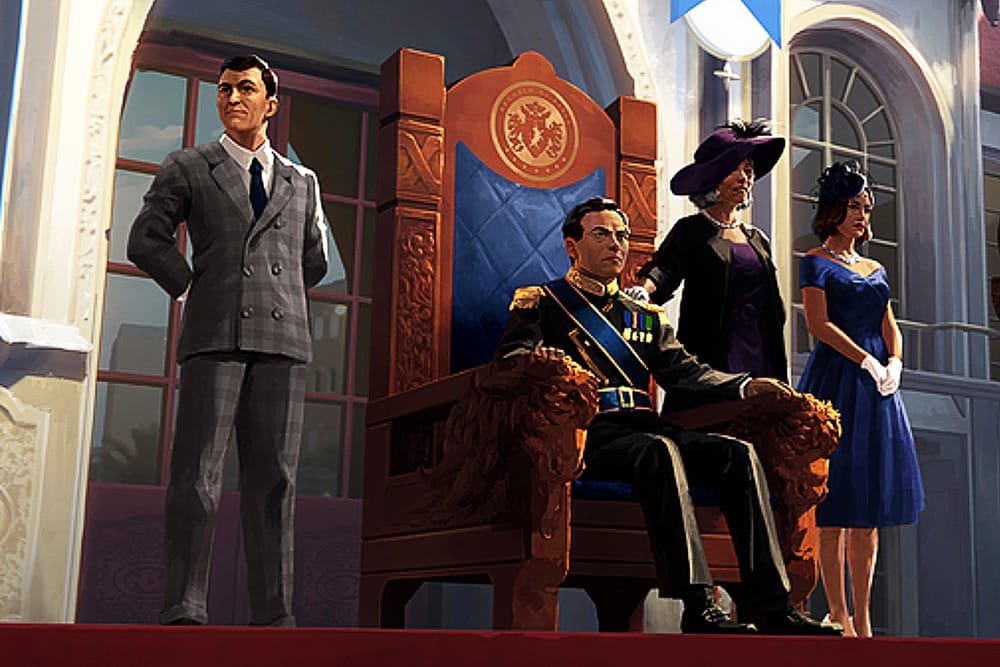
In 2020's Suzerain, we panicked as we guided Anton Rayne, Sordland’s democratically elected president, through a tumultuous period in his fictional country’s history. Kingdom of Rizia is a 2024 DLC that puts us in the shoes of Romus Toras, the new king of Rizia. You have absolute power, but absolute responsibility when anything goes wrong, too — and it will, trust me. Hope for the best, but expect the worst is a useful motto here, as we’ll find out when we look at Suzerain: Kingdom of Rizia.
The Foundation of a Character
When I was a fighting-man, the kettle-drums they beat,
The people scattered gold-dust before my horse's feet;
But now I am a great king, the people hound my track
With poison in my wine-cup, and daggers at my back.
The Road of Kings, Robert Ervin Howard
Like in the base game, a prologue tells us the story of our protagonist’s early life, and also gives us chances to shape his political views, relationships, and actions. Even at this early stage, what we choose to do will have significant ramifications further down the line. We also customize our Romus’ appearance before the action begins.
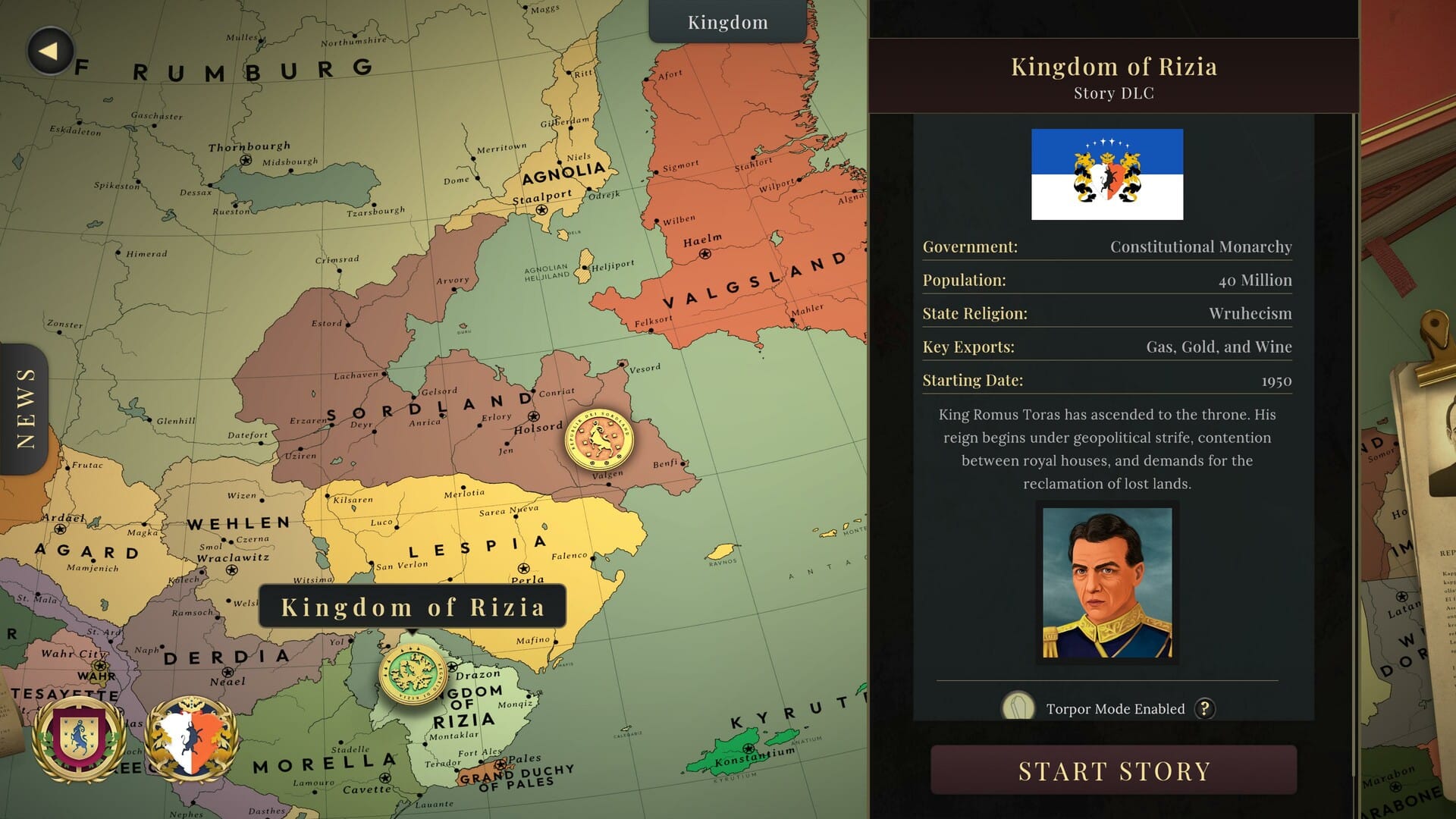
Some of it will be unfamiliar to old Suzerain players, though. Decrees, for example, are a new feature; laws you pass without having to worry too much about politicians or government oversight. Rizia has a House of Delegates, but it’s more of an advisory body than an arm of government. You control the media, too. The real power sits in your hands.
A king is also different from a president, of course. Monarchs are often involved in their country’s religious life, which is reflected in the game as well. Three main religious groups dominate life in Rizia: Wruhecism, Dastnurism, and Golcondism. They seek your support and feel irked when you favor one group over another.
Making the religious balancing act even harder is that neighboring countries, each favoring a particular religion, will also scrutinize your decisions, and it turns into a factor during negotiations. Wruhecism is the official religion of Rizia, but the kingdom’s religious future is not set in stone. Or perhaps you will choose to turn away from religion altogether? You can take several paths, with all of them leading you to different outcomes, much like in a visual novel.
A Crown Sits Still
Was it not said, sir,
By some philosopher as yet unborn,
That any chimney-sweep who for twelve hours
Dreams himself king is happy as the king
Who dreams himself twelve hours a chimney-sweep?
Life Is A Dream, Pedro Calderón de la Barca
As a king, your social circle is also broader and more diverse than in the base game. During your reign, you encounter grizzled military veterans, idealistic princesses, unscrupulous business people, and perceptive butlers. They will offer their advice, whether it’s sound or not.
What I enjoyed was hearing more distinct character voices this time around. Some aren’t afraid to quip now and again, either, and it opens up hilarious exchanges. Throughout a playthrough, the characters will change, including in how they view you, which makes it feel dynamic and dangerous, even though you sit at the top of the hierarchy.
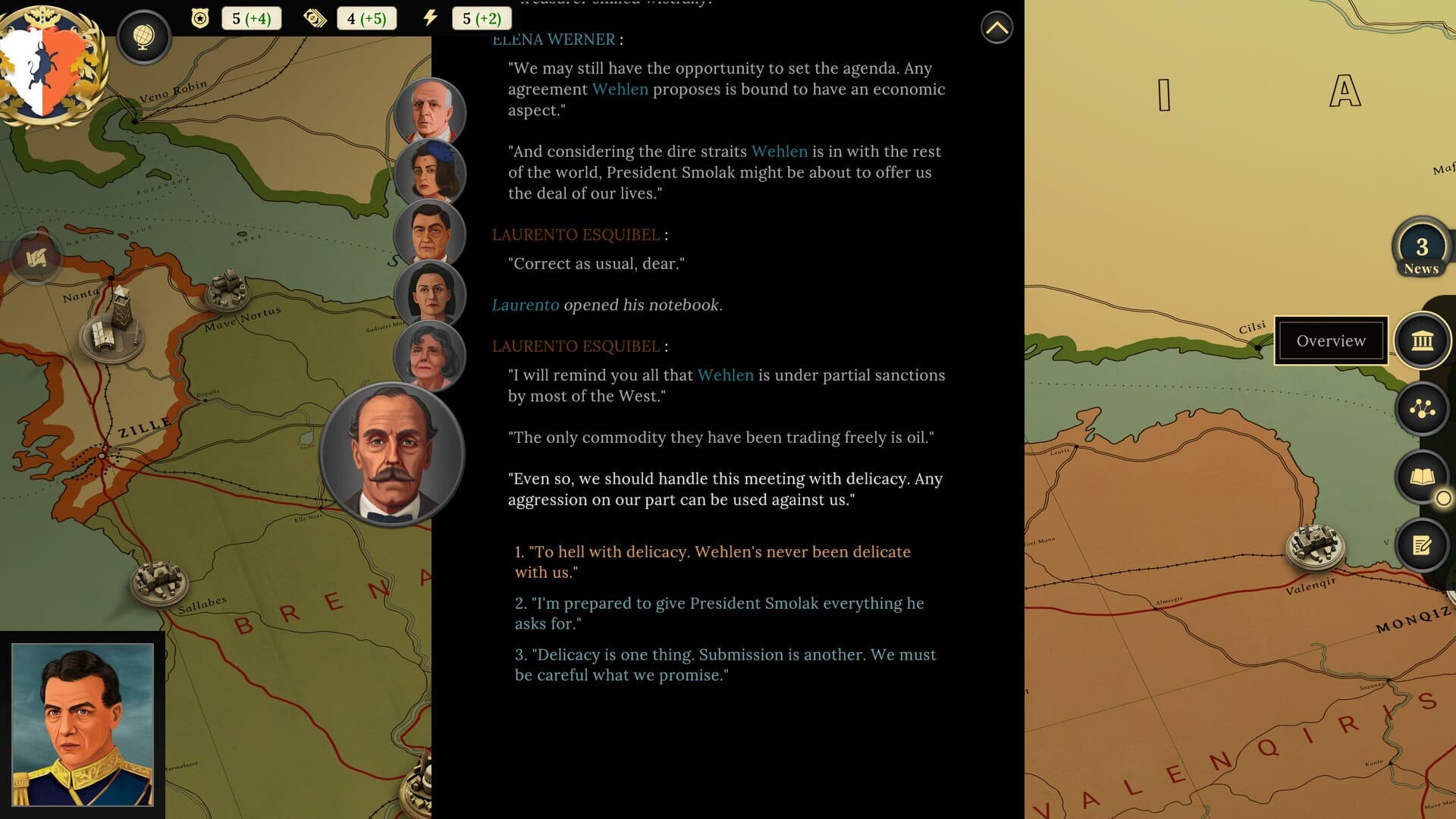
The royal line of succession is another added factor in the Kingdom of Rizia. In a democracy, your successor is whoever the people choose during the next election, but that’s not the case in a kingdom. It’s an interesting problem.
Tradition comes up much more in Rizia than in Sordland. Many Rizians cling to traditions, with the king as their figurehead, to find a sense of stability. Castles, knights, and jousts don’t dominate the world anymore, though. Planes rule the skies, and submarines stalk the waters. Radio and television bring news into people's living rooms. Part of the fun is looking for a way forward, despite how difficult it becomes to navigate your responsibilities. You never forget how heavy the crown weighs upon you.
Borders Delineate a Future
I mean to say that man has a tyrant — ignorance. I voted for the death of that tyrant. That tyrant engendered royalty, which is authority falsely understood, while science is authority rightly understood.
Les Misérables, Victor Hugo
Rizia lives in a different neighborhood in the Suzerain fictional universe. The kingdom sits between Lespia, Wehlen, Morella, Derdia, and Pales. This gives you an opportunity to learn more about the history and cultures of another section of Merikopa, the fictional landmass of this universe. Each of these countries also has its own political objectives.
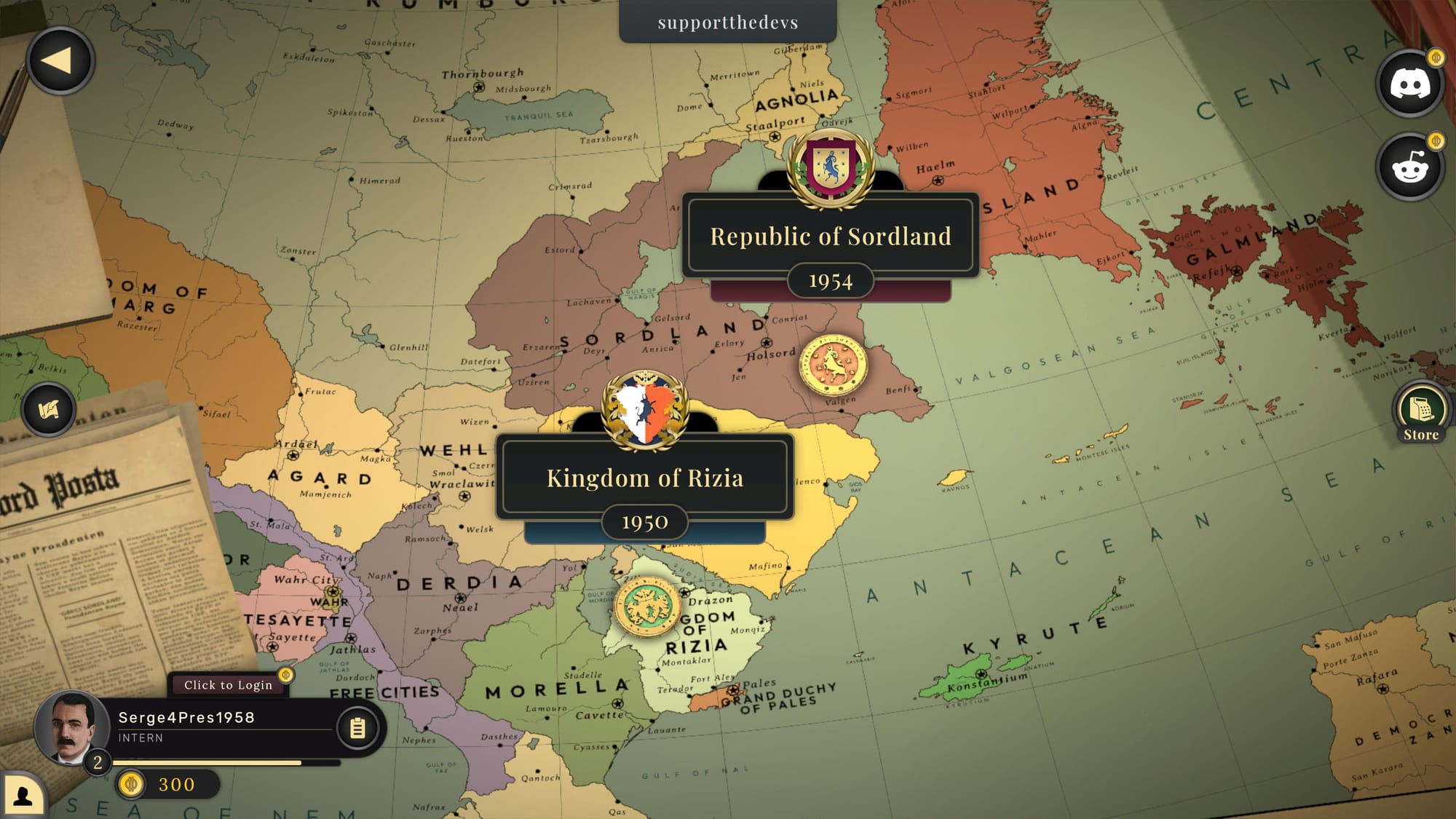
Lespia is a proponent of democracy and free-market capitalism. They are a key member of the Arcasian Treaty Organization, an alliance that seeks to stop the spread of Malenyevism, which advocates for a global workers’ revolution. Rich Lespian companies have spread across Merikopa, and their government is never far behind, either.
Wehlen lives under the gaze of the dictator Wiktor Smolak. When you ascend your throne, Smolak has already strengthened his grip on the military, using it to eliminate political opponents, minorities, or anyone he doesn’t like. The support from United Contana, a powerful Malenyevist confederation of states, allows him to stay in power.
Morella’s recent economic crisis paved the way for its first left-wing government to win an election and take office. Alma Saltana, its new prime minister, is eager to break away from the path of the nationalist parties of her country’s past, especially as it struggles to take advantage of its natural resources.
Derdia is the only Golcondist country in the region; as a result, its leader, the Supreme Wiseman, places importance on political issues that affect his religion’s adherents. Its community of expatriates also links it to various countries in the region. Although the country struggles economically, its military remains formidable.
The Duchy of Pales was a part of Rizia for over a century — a contentious bit of history for both countries. This small absolute monarchy, with its own plan to exploit its natural resources, bolstered its influence by forging strong ties with Lespia. Pales’ current ruler, Duke Axel Reinhart, is a hot-headed playboy, though he is also serious about his royal responsibilities.
Division With a Castle
A very fit consideration, and matter of reflection, for those kings and princes who sacrifice the lives of so many people, only to flatter their ambition in being masters of some pitiful corner of this small spot.
Cosmotheoros: Or, Conjectures Concerning the Inhabitants of the Planets, Christiaan Huygens
Rizia’s aristocrats have their agendas, too. Three royal houses control regions within Rizia: House Toras, House Sazon, and House Azaro. This structure adds another layer for you to navigate, because each house seeks to enlarge its influence and ingratiate itself with the king, although their aims might not always align with what is best for the country.
Authority is a new resource that measures how well your subjects respect your rule. It’s tricky to balance it, since certain actions and decrees diminish your authority, so it’s often a good idea to keep track of those fluctuations, along with the other resources: your kingdom’s energy and money. Unlike the base game, it’s easy to track your assets though, meaning it allows you to plan your future expenses. It also means you’ll still have to choose which issues you care most about, since you have a limited amount of resources and time.
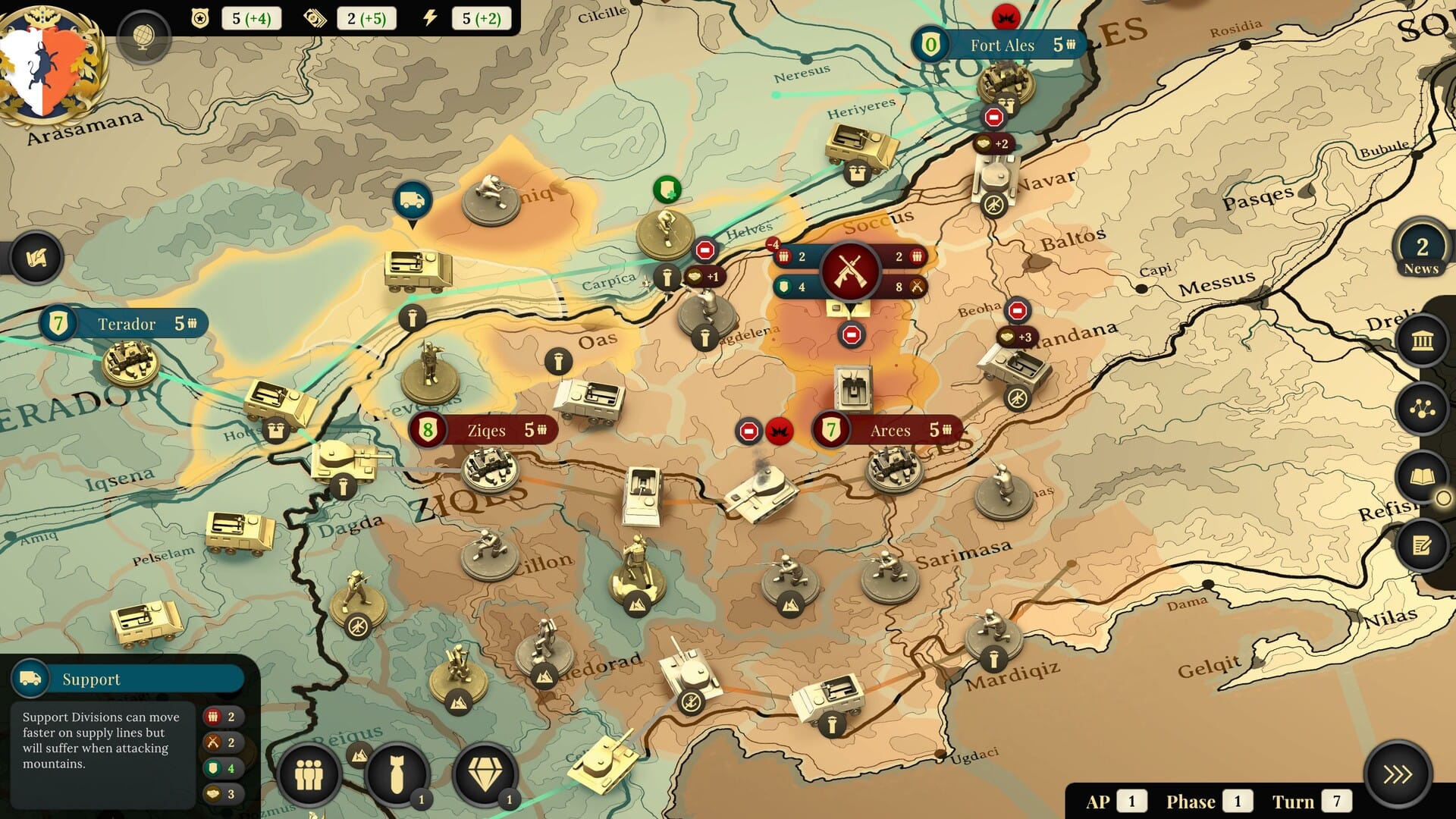
Kingdom of Rizia also boasts a new combat minigame. This tactical system is an improvement over the combat in the previous Suzerain game, where it occurred off-screen or in story sections. The fact that you can determine your army’s composition and military spending gives you even more agency in this area, too.
You can’t keep everyone happy. It’s true in our lives, and it’s true in Rizia. How you navigate the confrontations influences whether you’re a deposed king or a celebrated monarch. Suzerain: Kingdom of Rizia doesn’t force you down a path that is “right” or “wrong”; it is a game that contains room for nuance and choice. Though, just like in Suzerain, one choice can bring you to ruin, and you can’t load an earlier save when you play on Torpor Mode — a devastating outcome after you have put a dozen hours into a story.
But perhaps that’s also one of the game's strengths. It makes you feel like your choices do matter, even though it’s often a heavy weight to bear. In a sense, this aspect is similar to a roguelike, where you learn from past choices or consult a guide to reach a desired outcome. Just like in a roguelike, you shouldn’t be too discouraged by your failures.
A Sanctuary at a Crossroads
Because a man plays a king superbly well does not mean that he would make a good king. Comstock Lode, Louis L'Amour
Is Suzerain: Kingdom of Rizia a political simulator, a visual novel, a roguelike, or a strategy game? It incorporates elements from all those genres, perhaps even more so than its predecessor. The improvements, such as to resource tracking and combat, show that Torpor Games listened to player feedback, too.
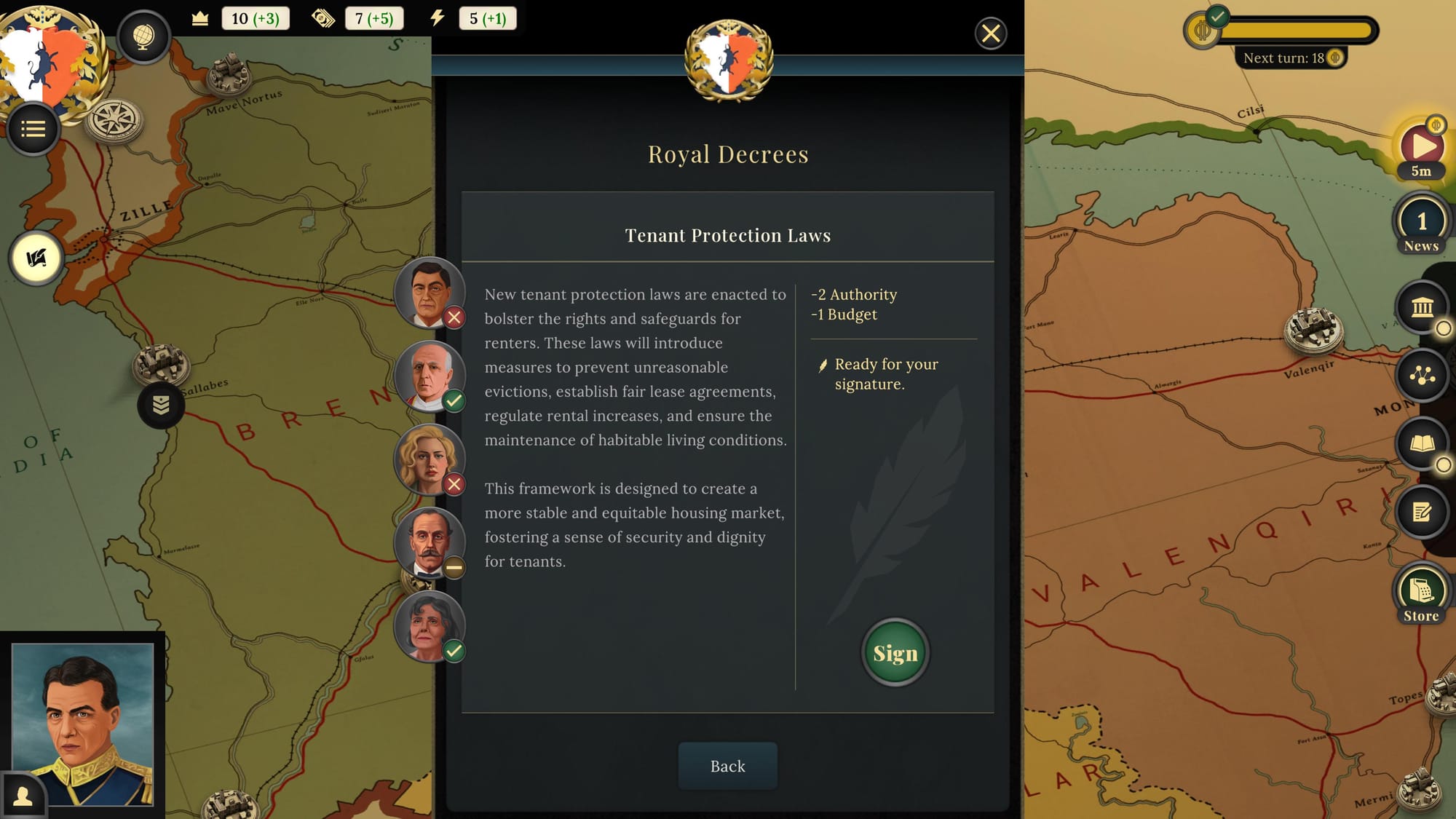
With these two Suzerain games, the developer signifies its attempt to carve a niche for thoughtful, politically conscious games. They haven’t tried to appeal to everybody’s tastes, allowing themselves room to explore topics that don’t receive much attention in the video game industry. That’s the beauty of indie projects.
Playing Suzerain: Kingdom of Rizia is a thought-provoking experience. Of course, most of us won’t ever ascend a throne, but living through the experiences of a king and agonizing over his decisions allows us to look at political issues from a top-down perspective. From there, we see how a society — a large group of people with different outlooks, backgrounds, and dreams — might work together, or fight amongst each other. It is up to us to lay the groundwork. Choices hold the power to shape our future.